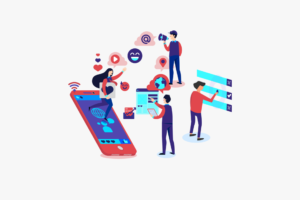Most people use social media to some extent. Whether it’s your grandpa sending you a message on Facebook, your 12-year-old cousin catching up on the latest dance trends on TikTok, or even your parents checking the news feed while eating breakfast, most of us are exposed to social media in one way or another. Among other things, the various social media apps available to us help us connect with others, share important information, and escape our responsibilities for a bit. Although it is a major convenience and has its positive impacts, social media can also have a negative impact on your mental health.

Studies have shown that overusing social media can lead to poor sleeping habits, increased negative feelings and dissatisfaction with life, and low self-esteem. Amanda Baughan, a graduate student at the University of Washington, studies human-computer interactions and shares that social media can also contribute to negative forms of “dissociation.” Dissociation is a reduced sense of self-awareness and attention. Baughan explains that in some ways, dissociating can be positive, such as when you’re absorbed by a good book or daydreaming. But dissociating can become negative when it interferes with time management. She does not place blame on the social media user for developing poor habits but instead blames the design of the platforms that keep us scrolling.
In a project completed by Baughan and her colleagues, participants used an app called Chirp, which operated like Twitter. Forty-two percent of participants were found to experience dissociation and “los[t] track of time” while using the app. Four interventions were then implemented: (1) custom lists that categorize user feeds into solely relevant information, (2) reading history label that notifies users when they were caught up on the latest posts, (3) prompts that remind users of how long they’ve used Chirp, and (4) readily available statistics showing how long users were on the app over the past week. These interventions proved to be helpful and decreased dissociation among participants. Of note, even though users were more attentive and reported that they felt “safer” with these interventions, they did not significantly change the amount of time they spent on the app.
Baughan emphasizes that adding these types of well-being tools to our favorite social media platforms can improve our habits and health. Other studies support this notion by showing similar tools can be used to “nudge” users and prompt them to be more reflective about their social media use. TikTok and Twitter already have some of these features available for use. So the next time you’re swiping through your feed, you may want to check out the settings and turn on the digital well-being options. Happy scrolling!
Peer editor: Nila Pazhayam
Great article, I see my husband can spend several hours looking at fb before he realizes the time. I will suggest those apps. Good Read
Thank you so much!
Super proud of you Honoree!
Aww, thanks for reading!